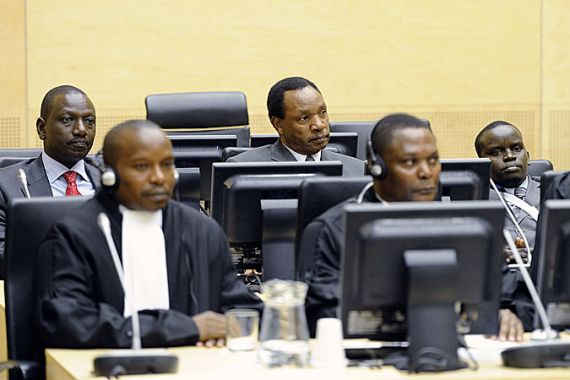Kenyan ex-ministers in court over poll unrest
High-profile figures attend international criminal court, accused of inciting deadly ethnic violence after 2007 poll.

Three high-profile Kenyans have appeared before the International Criminal Court in connection with deadly violence in their country that unfolded after disputed elections in 2007.
William Ruto and Henry Kosgey, both suspended government ministers, and Joshua Arap Sang, a broadcaster, are alleged to have stirred up ethnic hatred after the vote, leading to the unrest that left at least 1,200 people dead and 600,000 forced from their homes.
The trio are part of a group dubbed the Ocampo Six, which also includes two other government ministers and a police chief, accused of masterminding the violence.
All six men will all appear at the court in The Hague, the Netherlands, over a two-day period.
The group, who have all denied any wrongdoing, face charges including murder, deportation, rape, inhumane acts, persecution and torture following the contested re-election of Mwai Kibaki, the president.
“The allegations that have been made here sound to me like they can only be possible in a movie,” Ruto told the court.
“For an innocent man like me to be dragged here really is a matter that puzzles me,” he said before the judges cut him short.
Call for local solution
Ekaterina Trendafilova, the presiding judge at the hearing, told the suspects that they could be jailed if they made inflammatory speeches.
“There are some movements toward retriggering the violence in the country by way of using some dangerous speeches,” she said.
The ICC has divided the six accused into two groups according to their political allegiances, saying that there were grounds to believe that Ruto, Kosgey and Sang were part of a plan to target supporters of Kibaki’s Party for National Unity (PNU) in order to gain power for the Orange Democratic Movement (ODM).
The other three, Uhuru Kenyatta, finance minister, Francis Muthaura, cabinet secretary and Mohammed Hussein Ali, former police chief, are accused of being behind attacks against the ODM in order to keep Kibaki’s party in power. They will appear before the court on Friday.
The unrest following the December 27, 2007 general elections turned into ethnic killings in what was country’s worst violence since independence in 1963.
Kenya has filed an application for the court to declare the two cases inadmissible, saying the country was competent to handle the prosecution itself.
But the ICC took charge of the case after Nairobi failed to set up a tribunal of its own in line with agreements brokered by the UN.
Prior to Thursday’s hearing, a group of 40 Kenyan members of parliament gathered to protest against the ICC proceedings, calling for a local solution.
However Luis Moreno-Ocampo, the ICC prosecutor, said “promises are not enough. You have to prove there is a national case for the same incidents, the same individuals and the same charges. There is nothing like that in the challenge”.
“You cannot commit atrocities to gain power or to retain power,” he also told journalists after the hearing.
“You cannot do it in Kenya, you cannot do it in Libya and you cannot do it in other parts of the world.”